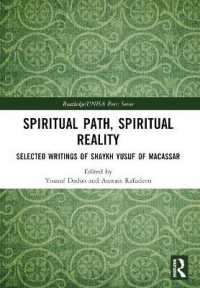- ホーム
- > 洋書
- > 英文書
- > Religion / Ethics
Full Description
The concept of bliss, in its connotations of beatitude and salvation, may seem of little relevance to so-called secular modernity. Bliss Against the World argues otherwise by advancing a novel framework of the entanglement between modernity, Christianity, and bliss through the thought of German Idealist and Romantic philosopher Friedrich Schelling (1775--1854). In Schelling's concept of bliss (Seligkeit), the idea of salvation from the world mutates into a burning concern with the negativity of the modern world, and with the way modernity inherits the Christian promise of a non-alienated future that never arrives. Throughout his thinking, Schelling grapples with the question of theodicy: Can this negative world be justified? And what would it mean to be free of the world--to enact bliss right now--when the idea of otherworldly salvation increasingly loses its conceptual relevance? This leads Schelling to conceptualize bliss as what refuses or apocalyptically annihilates this world and its divisions and burdens.
Bliss Against the World reinterprets Schelling's philosophical trajectory from the 1790s to the 1840s, showing his metaphysics, philosophy of religion, and natural philosophy to be underwritten by the apocalyptic tension between bliss and theodicy. It argues that this tension is located likewise at the heart of modernity and reconstructs the Schellingian genealogy of the modern age as intensifying what may be termed the general Christian contradiction. It also focuses on Schelling's anxiety about the possibility of universal history in the dark and de-centered universe and critiques his Romantic construction of humanity and his geo-racial theodicy of history--a theodicy that refracts and legitimates the violent logics of post-1492 modernity, including European colonialism, racialization, and transatlantic slavery.
Bliss Against the World thus theorizes bliss not only with, but also against Schelling, who emerges from this book as a key thinker of modernity, and of the Christian-modern trajectory as a path to salvation in the shadow of whose failure we continue to live.
Contents
General Introduction: Modernity, Theodicy, Bliss
Part I Why Must This World Be?
Chapter 1: The General Christian Contradiction
Interlude I: Ordo quis datus?
Chapter 2: The Demiurgic Subject
Interlude II: "Abyss of Repose and Inactivity"
Chapter 3: Evil Is but a Shadow
Part II The Dark Ground
Introduction to Part II: On Schelling's Post-1809 System Narrative
Chapter 4: Universal Ekstasis; or, Fallenness and Method
Chapter 5: Universal Spiral
Interlude III: Clock Time as Fallen Time
Chapter 6: The Race to Bliss: Assembling Global Humanity
Conclusion: Bliss Against Theodicy








